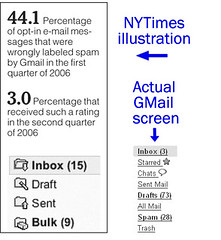by Eszter Hargittai on October 2, 2006
.. or where we confirm that I am, on occasion, obsessive about some things. The New York Times has a short piece about GMail’s increasing ability to avoid false positives when it comes to legitimate commercial email requested by the user.
What caught my eye was the accompanying illustration (on the left in this image below).

That Inbox screenshot is not from a GMail account. GMail calls spam “Spam” not “Bulk” as per the screen capture on the right. A commenter on my Flickr stream noted that the illustration they put up comes from Yahoo! Mail. Hah. How hard would it have been to feature the matching Inbox?
by John Holbo on October 2, 2006
At the Valve we’re hosting a book event discussion of Walter Benn Michaels’ The Trouble With Diversity [amazon]. You can read a sample chapter at TAP and are cordially invited to attend.
[amazon]. You can read a sample chapter at TAP and are cordially invited to attend.
In my post I discuss, in passing, Michael Lind’s Up From Conservatism (1996) – his notion of the ‘overclass’ – and so I happened to notice that he has a new book out just yesterday: The American Way of Strategy [amazon]. I haven’t seen much advance discussion of it. I’d be curious to hear about it.
[amazon]. I haven’t seen much advance discussion of it. I’d be curious to hear about it.
Doesn’t float your boat? I’ll try to come up with more comic book jokes for later.
by Kieran Healy on October 2, 2006
“ABC news runs a story”:http://blogs.abcnews.com/theblotter/2006/10/warnings_about_.html under the headline “Warning Signs about Foley Ignored for at least Five Years.”
“No one in the Republican leadership, nor Congressman Shimkus, saw those messages until last Friday when ABC News released them to the public,” said Speaker of the House Dennis Hastert (R-IL). But there were lots of warning signs. In 2001, pages were warned to be careful with Foley. In 2005, one page complained to his congressman about “sick” e-mails from Foley, a complaint passed on to the Speaker’s staff.”
You can see how the story is taking shape. I expect soon we will learn of the existence of a Presidential daily briefing headed “FOLEY DETERMINED TO STROKE IN U.S. CONGRESS.”
by Daniel on October 2, 2006
I have a post up on the Guardian blog, in praise of “stasis” as an under-rated strategy for government when compared to “reform“.
Of course, the general principle that the status quo is no worse than the status quo, and that all proposals for radical change should first be assessed to see if they can beat this hurdle, is one that has applications in foreign policy as well as domestic. For example, via Normblog Wole Soyinka is apparently castigating the UN and African Union for “inaction” on Darfur. Soyinka apparently believes that sponsoring two sets of peace talks, providing a massive humanitarian relief effort and negotiating the AMIS peacekeeping force don’t count as “doing anything”, which suggests to me (along with the fact that Norm links Soyinka’s speech to a series of diatribes by Eric Reeves on Jeff Weintraub’s site) that the only thing that would count as “doing something” would be war, or economic sanctions of such severity as to be roughly equivalent to war in terms of lethality.
Nobody, from Alex de Waal to Jan Pronk to Mark Malloch Brown, thinks that an invasion would pass the simple test of “would it make things worse or better”. As I’ve said repeatedly with respect to Darfur, it’s the height of irresponsibility to demand “action” without saying what that action might be, or to provide some kind of sensible assessment of its likely consequences.
by Ingrid Robeyns on October 2, 2006
There are a few places on Earth where it makes little sense to have a car. The innercity of Venice, for example. Or Manhattan. But apart from these exceptional places, is it possible for families in post-industrial societies to live comfortably without a car? [click to continue…]
by Harry on October 2, 2006
Because all the Uk bloggers have linked to it, I tried out the webcameron. Cameron’s introduction is very nice. He might want to read this paper by Erik Wright: it’ll provide some nice theoretical underpinnings. Oh, and everyone else might want to look at the draft manuscript for Wright’s book, Envisioning Real Utopias. (I don’t mean to suggest that Cameron won’t want to read the whole book, I’m just helpfully pointing him to the central ideas, so he can decide whether its worth his while to read the whole thing, presuming that he’s busier than the rest of us).
by Henry Farrell on October 2, 2006
I mentioned a “couple”:https://crookedtimber.org/2005/08/12/trahisons-des-clercs/ of “times”:https://crookedtimber.org/2005/08/16/witchfinders-general/ last year that Norman Podhoretz had demonstrably lied when he smeared critics of the Iraq war as rooting for America’s defeat. But I hadn’t realized how deep his hypocrisy went. Ezra Klein “quotes”:http://www.prospect.org/weblog/2006/09/post_1527.html#010145 Spencer Ackerman at Tapped.
In 1971, as editor of Commentary, Podhoretz wrote despondently about the war, “I now find myself … unhappily moving to the side of those who would prefer … an American defeat to a ‘Vietnamization’ of the war which calls for the indefinite and unlimited bombardment by American pilots in American planes of every country in that already devastated region.” By 1982, however, Podhoretz had relocated the true fault for the Vietnam debacle–not among the war’s architects, but among its critics. In Why We Were in Vietnam, he accused the antiwar movement of bearing “a certain measure of responsibility for the horrors that have overtaken the people of Vietnam.” Over the intervening decade, Podhoretz had somehow grown illusioned with the war and disillusioned only with its opponents.
Perhaps it’s not just hypocrisy. Some bizarre kind of displacement ???
